Firstly there is nothing criminal about lockpicking, it is the same as someone crawling in a broken window; thats the unlawful part. That lack of permission, add to this all this knowledge is widely available in any public library, available online and is required learning by criminals in jail. Criminals in jail only have one thing to learn, how to become better criminals; what else would they do with their time, (they exercise a lot as well) . . .
Hello, ever wondered how to pick a lock ?
Firstly a word about the law in almost all locations it is lawful to pick a lock open if would otherwise be entitled to open that lock . . .
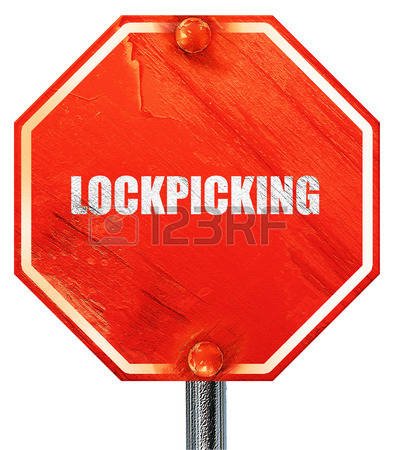
This has led to the LOCKsport rules such as
Never pick a lock you do not own,
Never pick a lock you rely upon,
Never pick a lock you do not have permission to use.

eg: lock picking can significantly damage locks, so practicing on your front door while legal would weaken your locks strengths over time. A landlord might own a lock but they would need the tenants permission before he chose to pick open his own lock.

In practice most pickers buy old or hardware style locks and just practice upon them, then they swap those different locks with friends for different practice, simply as long as you can clearly show you have a non criminal use for lockpicks the police should have little interest in you. As with everything lawyers need work so you should consult an attorney if you feel you need specific advice on the law, especially if you are currently out on parole etc . . .

There are hundreds of different styles of locks but for the average person we will consider the most averagely challenging, the type of lock on 95 % of house doors. Now to the funny thing about locks, locks are terribly made ( no offense America ) but American locks are among the worst security features in the United States. Let me explain please, basically any lock is designed to restrict entry to only those legally allowed access. So since most locks only really need to keep honest people out they tend to be very simplistic ! ! ! Remember a criminal will simply bypass the lock by entering through a weak window or by removing part of the roof. Since most locks are only there for insurance purposes they tend to be fairly easily defeated , but not by average people.

The average person know little or nothing of lockpicking so without such elementary knowledge a lock can do its protective job. Once any person understands how the lock is designed to work it is easy to work out ways to defeat it ; this skill cannot be prevented from criminals so no one tries to make locks stronger unless they have a specific reason. Locks are sold by price point, cheap hardware locks are almost useless; but high security locks are almost guaranteed to be invulnerable. However who wants to spend 6,000 dollars on their front door lock, especially when a determined person will simply find entry another way; via a window ? This is why physical locks are supplemented by electronic alarms and very scary people with guns or dogs, for example despite all this Fort Knox is still built with concrete walls six feet thick : )
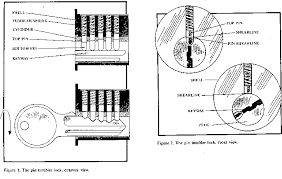
So can you learn to pick a lock? well yes but it is a very hard learning curve and you will need tools , for fun i often make my own lockpicks out of paperclips. The idea is if I need a lock opened then I should be able to use readily available items. Paperclips while not ideal are everywhere so they are good to practice with. But let us talk about real lock picks. Simply put the fewer lock picks you have the better you can open locks ! ! ! There are different styles of lock picks for certain lock types but here we will speak of the pin cylinder lock.
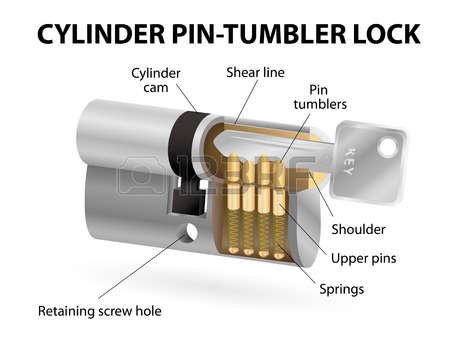
Most people learn by using a practice lock that has six pin holes and removing five so only one pin is available to move. Using a tension wrench you softly turn the cylinder plug. If you try and turn it with any force it will just bind and jam the pins so the key is very slight almost no movement. Along the cylinder are pins that are of different lengths, these heights match up to the depth of the biting cutouts on the locks keyface. There is a tiny difference in the alignment of these holes so the lock picker simply tests each spring loaded pin to see which one wants to move first. Once the first pin is found ( it might be number four in the cylinder stack ) the lock picker then seeks the next weakest pin. Only by holding careful tension can some pins be kept released while other pins are attacked by manipulation; this is the skill and art of lockpicking.
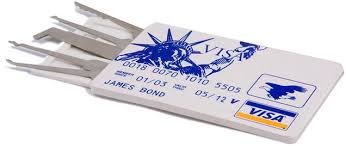
So North America is not very interested in lock security and rely upon basic lock types for physical security, this makes them very fun to practice upon and learn how to defeat. In most other countries they take lock security far more seriously and it is no coincidence every year the worlds best professional lockpickers gather in Europe for locksport, yes it is a SPORT !!! The Europeans add in extra features such as weighted springs or mushroom pins etc. these make things near impossible, but we are not here to speak about magnets or sidebars, lets just open simple locks . . .

So let us again look at our tools, surprisingly the most important item is NOT the lockpick but the tension wrench ! ! ! It is vital the lock turner fits perfectly to allow the picker to hold the cylinder slightly turned. This is the KEY to lockpicking ! ! ! So now we know the most important tool, the tensioner ; let us consider the picks themselves. Part of picking is knowing which different style of pick works best against different types of locks. But most pickers use HOOKS, DIAMONDS, REACHERS, RAKES, and JIGGLERS. Now normally jigglers are used for car doors, but these jigglers are different; these are awesome especially for unskilled people.
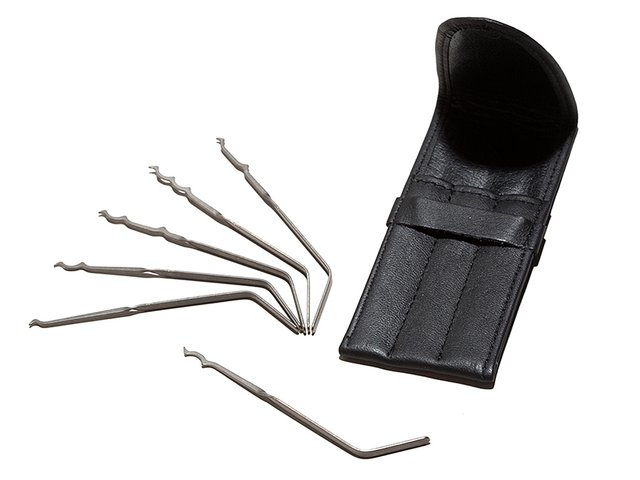
Remember it takes hundreds of hours practice to get good at lock picking. But if you want to defeat most types of locks you must learn to master the art of SPP ; Single Pin Picking is the most time consuming and most reliable way to open some lock types. We will not talk about shims, bypasses, guns, or bumping. Let us keep it simple and show you some BOGOTAS ! ! ! Bogotas are called rakes but since they are so different I call Bogotas , jigglers ; they are amazing remember locks protect themselves by having springs to keep the pins in the locked position with Bogotas we aim to set up vibrations within these pin stacks so the pins jump up and down at random, slowly twisting the cylinder catches some different pins at the shear line. This is a skill to be learned and will only work on certain types of locks, the beauty is most of these locks are the very locks you will see in society everyday and that you will practice upon : )
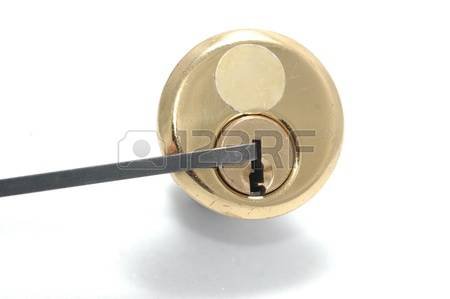
However certain locks can never be opened with jigglers and that is why learning SPP is vital, however the reality is no matter how good you get there will always be locks you will never be able to defeat. Plus as mass manufacturing gets better locks will get stronger and harder to be defeated. So now the next method is raking this is a more methodical attack against the pin stacks. So RAKING is another good way for the amateur lockpicker to open a cylinder lock. The key is to softly and lightly slightly turn the cylinder with the tension wrench as you use the picks to move the pin stacks.
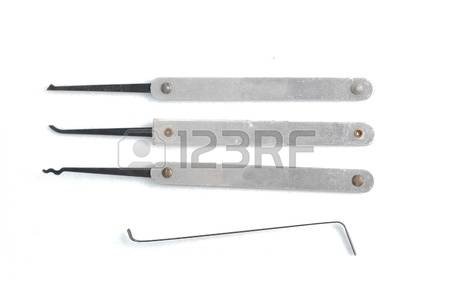
Most people buy simple practice locks that they can rearrange the internal lock pins to practice on. These they place in hand vices or on work benches for comfort reasons, remember you will spend hundreds of hours learning so being comfortable is nice ! ! ! The next thing is your fingers. Hold the tools lightly, you must just push or pull locks slightly because metal is flexible, yes you read correctly metal has slight gives in it prior to it locking tight. It is all these things people learn that combines the four human features of lockpicking, knowledge, skills, attitude and art ( art is your style as you choose methods to defeat each lock.
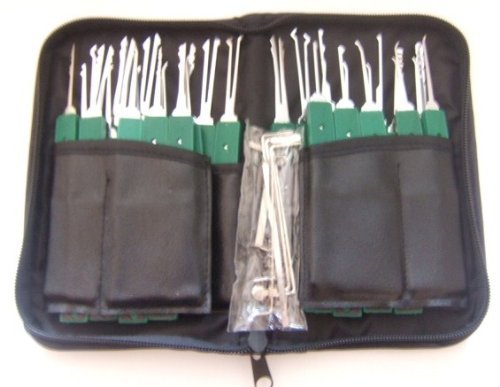
There are only about 6 things truly useful in this lockpicking kit and they are all those different tensioner wrenches in the middle, plus about 4 different picks, hook, diamond, rake and reacher; the rest you will almost never touch ! ! !
So here is a simple lockpicking guide book online , this guide is fairly well known. The other thing is the tensioners are the most important and even small kits have all the picks you will most likely ever need. Lock pick sets only need about 9 picks and larger sets are made only to increase sales ! ! ! Buying a lockpick set with 20 picks in it helps the seller make more profit and will make you a WORST picker. To many picks prevent pickers from getting fantastic with their few picks ! ! ! These are the picks you need for 95% of locks you will attack, Diamond, Half Diamond, Small Hook, Medium Hook, Rake (3 types), Reacher, Snake... And ; honestly do not buy a batarang ! ! ! yes honestly the batarang pick exists (remember Batman) , I think it was invented for marketing reasons, other picks are Bogotas jigglers and five very different styles of tension wrenches in different shapes and thicknesses . . .
http://www.gregmiller.net/locks/
http://www.gregmiller.net/locks/mitguide/
Thank you 123rf and Pixabar for the pictures...
Who are you networking with ; )
I've tended to passively watch such discussions in the past. I really only get involved in maintaining computer security, but you cannot begin to understand security if you do not start with understanding what an attack vector is. And you cannot understand that without seeing how the problem is tackled.
That's the first element in all this - from the perspective of the engineer on either side, there is a problem and there are anywhere from zero to infinite solutions. The morality is a social construct - an important one, but not one that the lock cares too much about. Something works or it doesn't. It's all covered in The Magician's Nephew.
The second element is what you do about those solutions once you have them. (Of course, you can't do anything about them until you have them.) This applies whether you're in this for sport or profession. Once you've mastered a lock, be it Yale or Kryptonite (yes, that is a brand), it's going to get boring very fast (to those in sport) or troublesome (for security engineers).
There's only one answer to that, build a better lock! Design a lock and key that will work easily (so it's practical) but where the flaw you exploited is absent. Those familiar with the British TV show The Great Egg Race will be familiar with such projects. Scrapyard Wars did something similar, but not quite as well IMHO, as The Great Egg Race was limited to common household items. Besides Prof Heinz Wolff was without equal in eccentricity and style. Only thing that could have made it better would have been adding Richard O'Brien.
Anyways, the bits and pieces around a home are ample to construct, and experiment with, different lock designs. Though to be able to test the design properly, you'd need to have metalworking tools to construct a model suitable for testing rather than the loose assembly of junk that was the prototype.
Why does this matter, if there are locks you can never defeat? Because, really, when you get down to nuts and bolts, you know there are always exploits. Perfect locks do theoretically exist, but even if someone designed one, it would be too expensive to produce. Complexity reduces reliability (unless you add extra quality control) and introduces new ways exploits could occur (unless you add extra testing).
Doubling complexity quadruples the quality control AND testing required, but only increases security a diminishing amount each time. Consumers won't pay insane prices for a lock thats only 0.001% better than the cheap one next to it.
So you know the lock can be beaten. All you have to do is get into the head of the designer. Engineering is methodical and systematic, the laws of physics don't vary, so if you can design a better lock, you're halfway to knowing what a "better lock" even means. From there, it's analysis all the way. You know the why, because you discovered that with your own experiments. You know the what, because you can look. The rest is just cryptanalysis, how to turn your knowledge into a pseudo key.
Electronic locks are an exception only because the DMCA forbids you from knowing how they work. Even where no similar law exists... well, just look up DeCSS Jon Johansen's terrifying treatment as an example of what happens even when such examination is protected by law.
However, what you do in the privacy of your bedroom should be ok.
Downvoting a post can decrease pending rewards and make it less visible. Common reasons:
Submit
What do I know I have invented the ultimate lock that cannot be bypassed, gunned, shimmed, forced or picked; in fact i have bought a 3D printer to make the prototype but I am also sure many other smarter people than me have thought they had the ultimate lock also.
The aim is a simple mass produced secure cheap lock that is undefeatable but again how can one know until it is made and field tested by experts. . . and thank you for your comments, I have no clue how electronic locks work but I know a lot about mechanical locks : )
Downvoting a post can decrease pending rewards and make it less visible. Common reasons:
Submit
There is really no difference between the two, at the abstract level. It's all about having a pattern of some sort that's expected and having a bunch of other patterns that will work regardless. It's then a game. Can the lock designer make it too hard to find those patterns? Can the lock breaker find the careless mistake or overlooked possibility?
You might know the history better than me, I rarely went into the locksmith groups on USENET, but I'm fairly sure Kryptonite locks were broken in the early 90s and I've not heard of any better mechanical lock since then although there must be many by now. What are some of the top contenders in the running these days?
Downvoting a post can decrease pending rewards and make it less visible. Common reasons:
Submit
Most seriously strong contenders are European. Simply America has little need for them. To explain this is simple, America rarely modernizes; business put something into service and leave it there forever as long as it is serviceable.
With a local domestic market of a quarter of a billion people who needs to modernize especially something like a lock. Another thing is American mentality toward crime, when people in America act anti-social such as breaking and entering they go to jail.
Afterwards these professional criminals cannot vote, have issues obtaining drivers licences and are barred from a lot of professions and no government work. While in jail they studied hard to become a better criminal yet any further unlawfulness on their part is paid for by insurance companies, which is priced into a customers premiums.
So simply there is no need for a truly secure lock in most of America, those who need ultra quality locks simply import overseas models. So overseas models are virtually unbeatable even by the best penetration testers.
One model from France actually has the key as a part of the lock itself, so unless you know you will be fighting this design no matter how skillful you are you cannot beat it simply from lack of the required parts . . .
And thank you for your wonderful comments previously ! ! !
Downvoting a post can decrease pending rewards and make it less visible. Common reasons:
Submit
Good disclaimers. In Virginia possession of lock picks on your person is considered the only evidence needed to justify intent to break and enter. So you do not want to keep your lock picks in your EDC here. Not sure about other states.
Downvoting a post can decrease pending rewards and make it less visible. Common reasons:
Submit
Of the entire 50 states I think Virginia has the strictest interpretation of the possession of lockpicks. Obviously there is more to things than simple having the things on you such as circumstances in most places . . .
It is interesting that many modern locks locksmiths will not even try they simply drill out the old lock. But some people travel the world in pursuit of challenging locks to try and penetrate . . .
I think most locksport world titles are held around Germany every year , or somewhere over there . . .
Downvoting a post can decrease pending rewards and make it less visible. Common reasons:
Submit